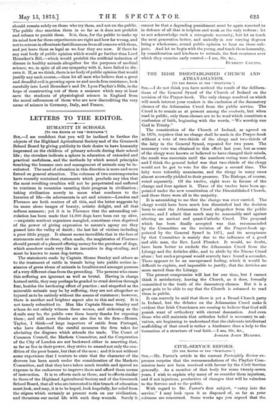LETTERS TO THE EDITOR.
HUMANITY IN SCHOOLS.
go THE EDITOR OF TEl "SPEOTATOR.1 SIR,—I am confident that you will be inclined to further the objects of the Highland Agricultural Society and of the Greenock School Board by giving publicity to their desire to have humanity impressed on the children of primary schools during their school life ; the circulars indicate a sphere in education of extended and practical usefulness, and the methods by which sound principles touching the humane care and management of animals may be in- culcated. The need of education in this direction is more and more forced on general attention. The columns of two contemporaries have recently contained statements which preclude any idea that the most revolting cruelties will not be perpetrated and suffered to continue in countries vaunting their progress in civilisation ; taking civilisation merely to mean what conduces to the Luxuries of life—its adornments in art and science—London and Florence are both centres of all this, and the latter suggests by its name alone images of beauty, artistic delight, and all that softens manners ; yet it is in Florence that the astounding cal- culation has been made that 14,000 dogs have been cut up alive, --exquisite sentient organisms mangled, sometimes even deprived of the power of giving expression to nature's agony ere they passed into the valley of death ; the last list of victims including a poor little puppy. It almost seems incredible that in the face of statements such as these, often made, the magistrates of Florence should permit of a placard offering money for the purchase of dogs, which somehow reads very like an incentive to dog-stealing, and must be known to mean dog-torture.
The statenients made by Captain Sloane Stanley and others as to the treatment of cattle in transit bring into public notice in- stances of gross abuse of animals in localities and amongst persons of a very different class from the preceding. The persons who cause this suffering are ignorant as well as brutal. Having in charge horned cattle, they may pechs.ps be goaded to cruel devices through fear, besides the hardening effect of practice ; and stupefied as the miserable animals may be by suffering, they are not altogether so injured as to be entirely without the means of resistance; however, there is another and brighter aspect also to this sad story. It is not tamely submitted to. Men like Captain Sloane Stanley and others do not calmly witness these scenes, and sickening as the details may be, the public owe them hearty thanks for exposing them ; and still more thanks are also due to the firm—Messrs. Taylor, I think—of large importers of cattle from Portugal, who have described the careful measures the firm takes for obviating the disgrace which attends the trade. The Court of Common Council, the Markets Committee, and the Corporation of the City of London are not backward either in asserting that, as far as lies in their power, they strive to amend not only the con- dition of the poor beasts, but that of the men ; and it is not without some experience that I venture to state that the character of the drovers has been much under the consideration of the Markets Committee, and that they have taken much trouble and spared no expense in the endeavour to improve these and afford them means of instruction. It is to efforts such as these, and to efforts similar to those of the Highland Agricultural Society and of the Greenock School Board, that all who are interested in this branch of education must look, and may, it is to be hoped, look hopefully, for relief from the stigma which certainly at present rests on our civilisation, and threatens our social life with such deep wounds. Surely it cannot be that a degrading punishment must be again resorted to in defence of all that is helpless and weak as the only redress ; let I us not acknowledge such a retrograde necessity, but let us teach the next generation better, and unitedly in our varying degrees bring a wholesome, sound public opinion to bear on these sub- jects. And let us begin with the young, and teach them humanity, by consideration and kindness to animals, the first creatures over which they exercise early control.—I am, Sir, &c.,
B u RDETr COUTrS.


































 Previous page
Previous page